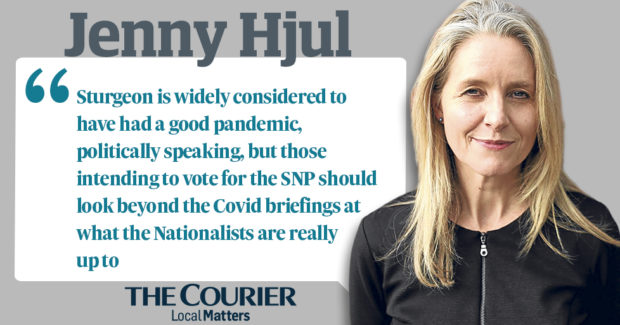What are Scots most anxious about at the moment?
Their jobs, businesses, future livelihoods?
Perhaps they have health fears or are worried sick about their elderly relatives in care homes.
Or maybe it’s their children’s education that keeps them awake at night, as schools continue to be disrupted by Covid, and prospects for a return to normal next year recede.
Low on the list of priorities is the constitution, with education, the NHS and the economy all deemed more important than another independence referendum, according to polls.
However, the majority of Scots are currently represented at Westminster and in the devolved parliament by politicians who do not share their concerns.
The SNP has 61 seats at Holyrood, out of 129, and the party holds 48 out of the 59 Scottish seats in the House of Commons.
The Nationalists’ ratings are high, and they expect to triumph in next May’s Scottish elections, undoubtedly bolstered by their leader Nicola Sturgeon’s daily television appearances since March.
Sturgeon is widely considered to have had a good pandemic, politically speaking, but those intending to vote for the SNP should look beyond the Covid briefings at what the Nationalists are really up to.
They won’t have to look very far to find a party as obsessed today as it has ever been on breaking up Britain.
Despite the fact that Scotland is still battling coronavirus, with transmission rates high enough in parts of the country to apparently justify a second lockdown, the sole focus of the separatists is constitutional upheaval.
This became clear during the SNP’s recent selection contests for Holyrood, when many of the candidates said securing independence was their main motivation.
More senior Nationalists, such as Ian Blackford, the SNP leader at Westminster, went further, saying that a new referendum ‘must take place’ next year if the SNP wins the May election.
An independent Scotland, he said, would be a nation where we ‘recognise our responsibilities’, but for the Ross, Skye and Lochaber MP, partisan interests are a greater responsibility than repairing the fabric of his country.
His Westminster colleague, the Perth MP Pete Wishart, also seems to have forgotten that we have not yet beaten the virus.
Winning independence, he said last week, was ‘the only thing that should matter just now’.
Wishart’s constituents, many of whom work in the beleaguered hospitality trade, may balk at the SNP’s insensitivity.
And so might the people of Paisley and Renfrewshire South, whose MP, Mhairi Black, tried to hijack a parliamentary debate on the job retention scheme so she could push the case for independence.
Without the UK Treasury’s deep pockets, there would be no funds to bail out the people she was elected to represent, but the electorate’s immediate needs come a poor second to the cause of secession.
The Speaker cut Black off for being irrelevant but the SNP don’t fight Westminster seats so they can contribute constructively and make lives better for voters.
Their strategy is to disrupt proceedings in London whenever an opportunity arises, or even when it doesn’t.
In another debate last week, about human rights and democracy in Hong Kong, the SNP member for Coatbridge, Chryston and Bellshill, Stephen Bonnar, made what foreign minister Nigel Adams joked was an inventive segue to Scottish independence.
The SNP by definition is contemptuous of the UK parliament and most of its MPs will now only appear virtually, arguing that they are following Scottish rules to stay at home.
But they can’t vote without attending in person, and nor can they participate in general debates, or in any stage of a Bill.
It should be remembered that parliament sat throughout the Second World War because MPs believed it was their duty to legislate and to hold government to account.
The Scottish Nationalists didn’t have seats then but would they have put party interests ahead of the county in that adversity too?
There has been a backlash to Blackford’s call for an indy ballot next year, with other factions within the SNP reportedly suggesting an elongated timetable of 18 months to two years.
But Sturgeon herself announced in September that a draft referendum bill would be brought forward before May’s election, force feeding her break-up agenda on a population still reeling from pandemic misery.
The level of poverty and deprivation in the east end of Glasgow is unmatched anywhere in western Europe and male longevity is on a par with sub Saharan Africa, as another son of Paisley, Andrew Neil, pointed out on the BBC recently.
Problems that existed before the disease outbreak have only been exacerbated as it hits poor communities the hardest.
Surely there should only be one goal for the SNP just as there should be for any government at the moment, to steer the country out of the Covid crisis and rebuild it back to health.


